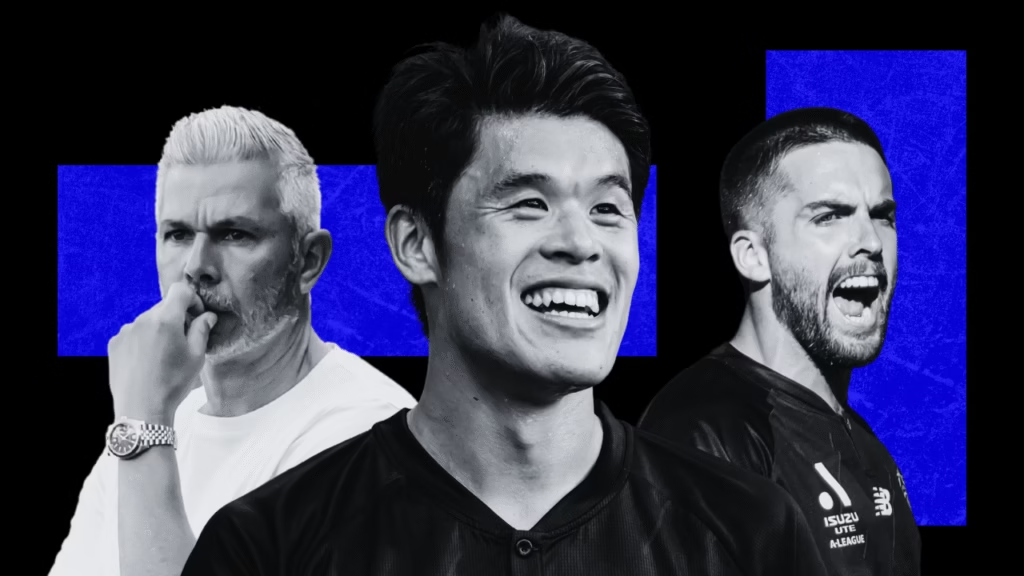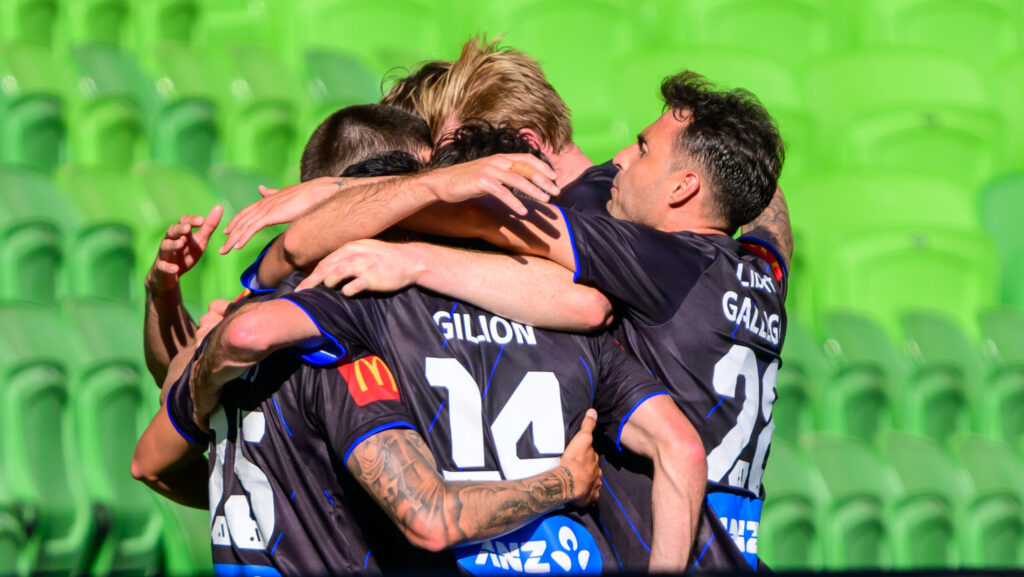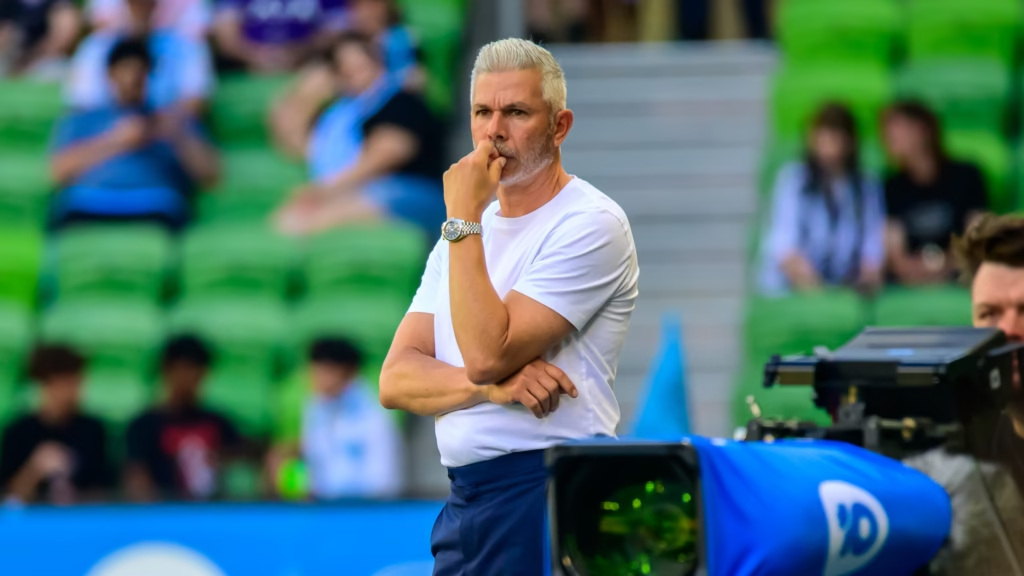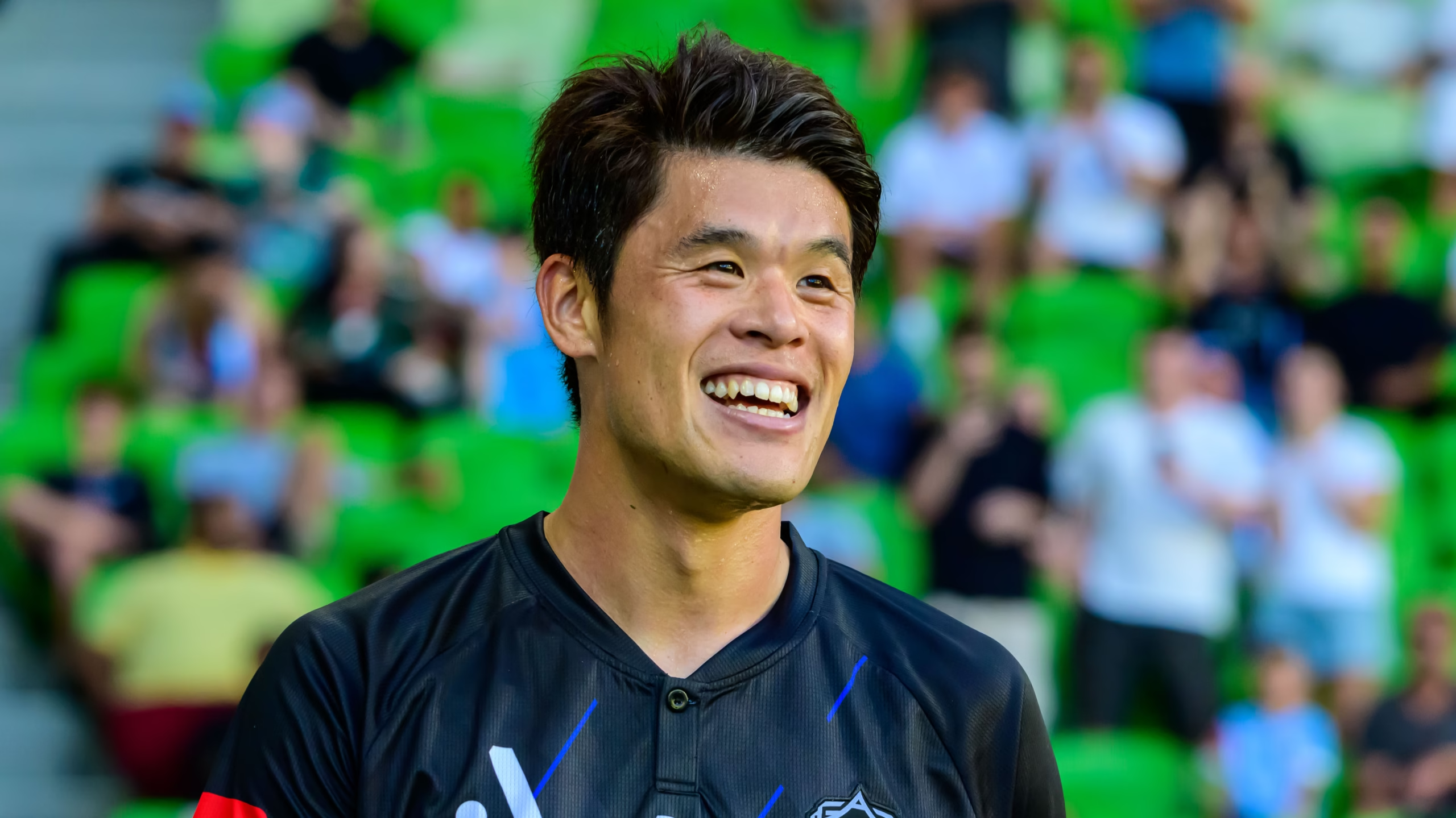
Auckland FC 2024/25 A-League Men's season review. Photos: Marcus Robertson / Round Ball Australia.
The first timers – the Premiers. Auckland FC entered the A-League Men with serious force and that momentum carried them through to claim New Zealand’s first ever piece of A-League silverware, in Round Ball Australia’s next season review.
Steve Corica’s team entered the competition with the goal of winning silverware within three years. They were owner Bill Foley’s instructions. They did it in one. Not only on the pitch, the Black Knights were vastly successful off it.
They truly are the blueprint of expansion and alongside the Wanderers represent the lucrative possibilities behind the A-Leagues current expansion strategy. Connect to the community, have an identity and dive in the deep end.

Season Grade: A
Let’s get the obvious out of the way first – failing to clinch the Championship loses them marks, but that’s the only real blight you can put on their campaign. In terms of an introduction to the furnace of A-League finals, having your first tie up against a hungry Melbourne Victory side is no gentle welcome.
Corica’s side were steady in the first leg, but with their backs against the wall Victory came good at the right moment, and condemned the end of Auckland’s inaugural campaign to heartache.
It shouldn’t diminish however the amazing regular season that the Black Knights presented. In a season where almost every single team was wildly inconsistent, Auckland were the only team who consistently held their place toward the top of the table.
Adelaide started strong but faded late, Western kept in touch for most of the way but faded late, and Melbourne City only stormed home after majority of their injured players returned.
Auckland were relentless. Too persistent with their quality and experience, to the point where no other teams really stood a chance of taking the regular season trophy away from them.
Hard out of the blocks
When the Western Sydney Wanderers entered the A-League over a decade ago, they set the benchmark for what the potential of what a new club could be in their first season in the league. On the pitch, they were Premiers and made the Grand Final.
Auckland fell just short of that mark. But off the field, you can make the argument that they surpassed even what the Wanderers achieved in terms of the hype around a new team and connection to the local community.
As soon as Bill Foley was confirmed as the new license holder for the next round of expansion, work began to ensure that not just they would build a team that would be successful, but truly represented the area that was on their badge.
Their first recruits were New Zealand and Auckland locals, and they persistently reaffirmed their commitment to celebrate their culture and empowered their fans to get behind them in the first year. The result was an average home crowd of 18,890.

They were far and away the best in the league, and 28 per cent better than what the Wanderers managed in 2012/13. Their existence birthed the New Zealand derby which set records for domestic football in the country and completely blew out of the water the two previous iterations of Auckland professional football – the Football Kingz and New Zealand Knights.
Good support was matched by their performances on the pitch, breaking records for the longest time to concede a goal and drop a perfect start to the season (across different categories of A-League and Australian top flight records).
Their early run of games (and wins) in Auckland helped set the tone for the season that would be, and they just kicked on from there.
O captain, my captain!
The marquee signing of World Cup players and AFC Champions League winner Hiroki Sakai was a statement of intent. Whilst the rest of the league – pushed by financial necessities – was trending towards younger squads, Auckland were going for outright quality.
Not that they really had much of a choice either. Without an academy at the time, there wasn’t exactly any youth prospects to promote. But Sakai was the mark of what was to come, and he exemplified the Auckland spirit that carried them through the season.
Extremely hard to beat defensively, and would pick his moments brilliantly to crusade forward down the right wing and make his impact in the front third of the pitch. He wore his heart on his sleeve and his passion was well received by the Auckland faithful, who repaid it in spades. He offered a crucial example to follow and led his team with distinction.

Other visa signings were superb. Louis Verstraete and Felipe Gallegos were immense in midfield, whilst Guillermo May led the line and scored crucial goals. Even Neyder Moreno, who was relegated to bench appearances for most of the season, came on at pivotal moments and earned his team vital points at the death that secured them the Premiership Plate.
Credit must also go to Alex Paulsen, who continued his stellar form playing professional football in New Zealand (after an amazing breakout season with the Phoenix) – earning another goalkeeper of the year gong at the Dolan Warren Awards, and returning back to parent club AFC Bournemouth with silverware on his CV.
Where to from here?
The question of what happens next for Auckland FC is much broader than just the next A-League season.
As Premiers of a top-flight competition – almost every single league in the world would therefore permit Auckland into the continental competition of their region. But not here. By virtue of playing in an AFC domestic league as an Oceanic club, they are ineligible for both iterations of their Champions League competitions.
This makes Auckland (and Wellington) part of just a handful of professional clubs worldwide that don’t have any possible access to FIFA’s new Club World Cup (CWC). This must change.
Bill Foley’s newest venture has submitted their interest in participating in the OFC’s new professional league, slated to begin in early 2026. This tournament will be the OFC’s path to the Club World Cup (CWC), but it’s still unclear how an A-League team like Auckland would manage competing in both, or how they would be restricted in any way as well.
Asia and Oceania’s muddling of footballing is messy at the best of times – but this exact conundrum is the reason why amateur side Auckland City is currently over in America participating in the inaugural CWC.
Auckland will bounce back next A-League season. They’ve retained most of their quality and experience and will have the advantage of another odd season. But their future beyond the A-League remains in doubt.
That needs remedying.
